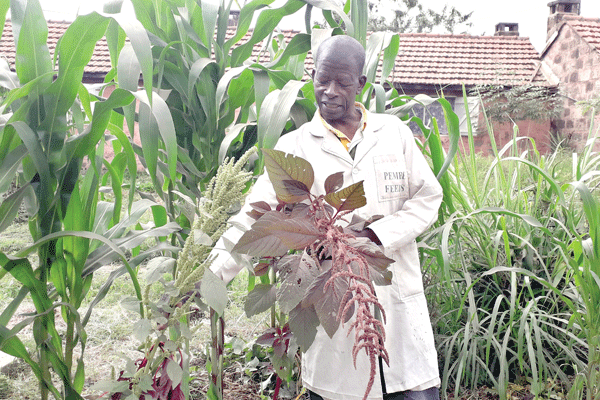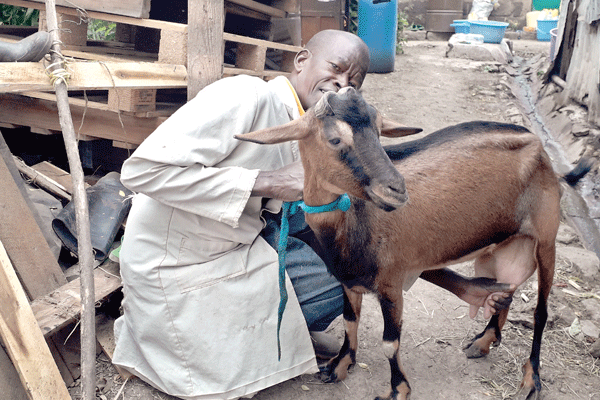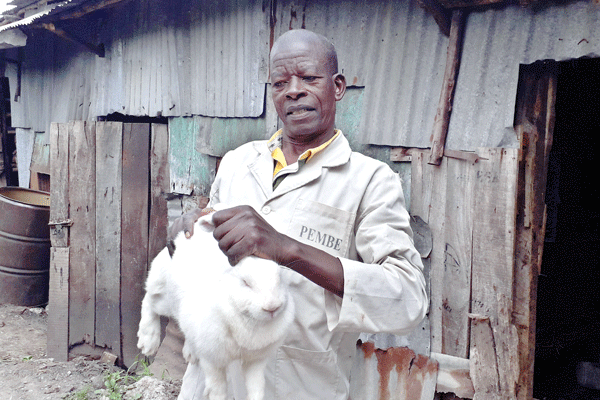City rabbit king, Francis Wachira, 70, goes organic
By Milliam Murigi, September 17, 2019On a tiny urban smallholding in Nairobi, Francis Wachira, 70, tends goats, rabbits and chickens and grows vegetables for subsistence and commercial purposes.
In a tiny plot in Maringo estate, Eastlands, is a tiny farm known as Kiriko Enterprises.
The plot houses 40 dairy goats, 500 rabbits and kienyeji chicken. He also grows indigenous herbs and exotic vegetables.
When we visited the urban farmer recently, I observed that he has constructed modern pens and hutches to ensure the animals are safe and comfortable, with cages occupying the biggest space.
As I walked about, goats hopped onto vantage points in the pens to see their visitors.
There wes absolutely no stench of animal waste and I couldn’t believe I was in a farm full of goats and rabbits.
After visiting farms over the years, I was expecting to be welcomed by strong farm odours.
“Proper farm management is key to minimising farm odours. Feeding your animals with dry matter reduces farm animal smells to almost none,” said the father of three.

Wachira started farming in 2002 with two expectant does. Back then, he was keeping them for home consumption.
The rabbits reproduced so fast that he had to give them away to his neighbours for free as he could not feed 500 bunnies.
In 2005, he attended an entrepreneurship course organised by PCEA church Makadara.
After the training, they were asked to choose what they were interested in. Wachira opted for rabbit farming since it was a relatively new venture in Eastlands and seemed viable commercially.
Problems arose when the family and community did not embrace rabbit farming, which they considered a “boy thing”. Undeterred, Wachira put all his efforts into it.
“I quit my job at Marikiti market where I was earning Sh100 per day as a fruit vendor. I also sought better breeds from research institutes and outsourced some from Denmark,” he says.
Lady Luck knocked his doors a year later as he was contracted by Tuskys supermarkets to be supply 10 rabbits every week.

The order kept rising and he also got other deals to supply rabbit meat. Meanwhile, he had introduced dairy goats in his farm.
Currently he supplies at least 200kg of rabbit meat per week to different hotels, supermarkets and individuals.
He also started training other farmers who had by now realised that rabbit keeping was profitable.
He says rabbits are fed twice a day;in the morning and evening, a schedule that should be strictly adhered to. Giving the animals excess food hoping to make them grow faster does not work.
“A mature rabbit should only be fed 150g of pellets per day and about 50g for weaners. The quantity, however, depends on the rabbit’s age and body size,” he says.
In 2007, Wachira started attending agricultural talks and trainings as well as the annual Nairobi International Trade Fair, where his animals have been winning awards for years.
“My dairy goats give me between 80 to 100 litres of milk daily. A litter goes for Sh200 while rabbit meat ranges between Sh500 and Sh600 per kilogramme. I cannot complain about lack of markets,” he says.
Additionally, Wachira has turned a corner of the plot into an orchard where he grows fruits such as grapes, avocado, bananas, sugarcane and mangoes, among others.
He has also ventured into indigenous and exotic vegetables such as soft lettuce, amaranths, spinach, spider plant (sagaa), African nightshade (managu), Jews mallow (murere).
As an organic farmer, he only uses composite manure in his farm and even makes and uses his own pesticides.
He also maintains a bank, which helps him to retain the best seeds without buying hybrid varieties.
With support from Mazingira Institute in Nairobi and Rooftops Canada, he visited the US where he underwent training on urban farming.
His passion for rabbits earned him the name “Rabbit King” in Colorado, US, a title that has since seen him feature his produce at local trade fairs.
The agribusiness hasn’t been without challenges. The worst are water shortages since he uses piped water in his farm, which is rationed by the city council.
Emergence of new diseases sometimes leaves him counting huge loses. “I have to get animal feeds from Ruiru and Ruai because we don’t have suppliers in Nairobi city.
Sometimes, the feeds are poor quality because of dishonest manufacturers,” he said.
The pens should be large enough for the rabbits to stand on hind legs, lie down, and move around freely. A standard cage should measure 80cm in length, 60cm in width and 45cm in height.
